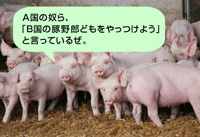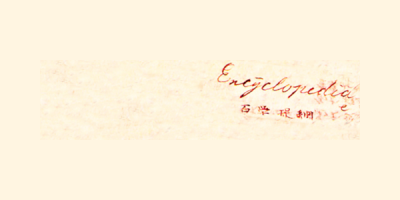
The consistency of a speaker’s character becomes an issue in particular in direct quotations.
For example, suppose a spy from Country B is sent to observe Country A. Even if the spy reports in the form of a direct quotation, e.g. “Those jerks in Country A are saying: ‘Let’s crush those swine in Country B!’” the spy will not be pressed to explain himself by his fellows (“What do you mean by calling us ‘swine’?”). Responsibility for the quote resides with the originator of the quote (the people of Country A), while the person quoting it (the spy) in “principle” bears no responsibility for it. (This is “principle” only however. In another example from the Rakugo(1) monologue entitled Hyakunenme(The 100th Year), there is a scene in which a large shop’s owner berates the manager’s assistant. “When the manager said to you ‘Tell him I’m coming now, damnit!’ you said to me ‘He told me to tell you he’s coming now damnit!’ The owner scolded the messenger for quoting the manager word-for-word, instead of saying “The manger will be with you in a moment.” Frustration such as that felt by the shop owner can probably be found in places other than the world of Rakugo).
Incidentally, in relation to the verbal character’s class, similar “principles” don’t always apply. For instance, imagine a refined lady asking a vulgar man to do something. Some days after the fact, the vulgar man might tell his friends about the request using an indirect quote (“Bwahaha! That’s right! Her ladyship asked me to do it!”) Or he might use a direct quote (“Bwahaha! That’s right! Her ladyship said: ‘I should like you to do it.’”). However, the lady does not have such freedom when quoting what the man said in response.
She could indirectly quote him (“The gentleman laughed, and followed my request.”) but she could not directly quote him (“The gentleman said ‘Bwahaha! Of course, I’ll hop to it.’”). No matter how much her prince pleaded with her (“Tell me what he said. Tell me exactly what he said without changing his words”) the lady’s character would be destroyed if she repeated the vulgar man’s “Bwahaha!” As a lady, her best option is to just keep quiet and smile sweetly, as if she had heard nothing.
Thus, the ability to quote directly is related to the verbal character’s “class.” A vulgar character can directly quote the words of a refined verbal character using a refined manner of speaking. However, a refined character cannot directly quote the words of a vulgar verbal character using a vulgar manner of speaking. The idea we looked at last time—that the character of the speaker must stay consistent when uttering a sentence—applies often to the content of direct quotations in the limited case in which the verbal character is a refined character.
So, why is this limited to the case of refined characters? It is not so much that refined characters must not say anything vulgar; rather, refined characters must not associate themselves with vulgar people. Refined characters must not loiter in front of signs plastered with phrases such as “SAVINGS EXPLOSION!” nor must they allow themselves to be in the presences of naughty children shouting expletives related to genitalia or scatologia.
However, in reality it is hard to avoid such things, and this in itself has a certain humor to it. Heh heh heh! (To be continued.)
* * *









(1) A form of traditional comedy in which the comedian tells a long, humorous story.